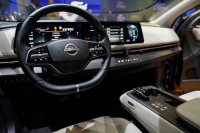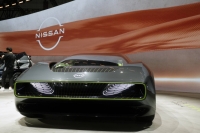Nissan is sticking with its plan to produce only electric vehicles in Europe by 2030 even after U.K. Prime Minister Rishi Sunak delayed phasing out the sale of new fossil-fuel powered cars.
"There is no turning back now,” CEO Makoto Uchida said Monday at an event in London. "We believe it is the right thing to do for our business, our customers and for the planet.”
The U.K. Prime Minister last week pushed back a planned ban on the sale of new petrol and diesel cars by five years to 2035 as the nation struggles to protect its auto industry from fierce competition. The move attracted criticism from Ford Motor, which said the transition to EVs would suffer as a result of the decision.
Nissan plans to launch 27 electrified vehicles, including 19 fully electric cars, by 2030. The Japanese company operates the U.K.’s biggest auto plant, in Sunderland, in northeastern England.
Carmakers are complaining that failure to comply with "rules of origin" agreed in Britain's Brexit deal with the European Union could lead to 10% tariffs on EVs traded between the bloc and the U.K. as soon as January. But Nissan chairman for Africa, Middle East, India, Europe & Oceania Guillaume Cartier told reporters that cars made in Sunderland would meet those rules.
Nissan also previously said that by its fiscal year ending March 31, 2027, 98% of its sales in Europe would be electrified — meaning either fully-electric cars or hybrids, which combine a battery and combustion engine.
The new goal of going fully electric in Europe by 2030 brings Nissan in line with alliance partner Renault, which plans to make the Renault brand all electric by then.
Ford and Stellantis also plan to be fully electric in Europe by 2030. Volvo plans to sell only EVs globally by 2030.
Competition is growing across Europe as Chinese EV makers like BYD, Nio, Zeekr and Great Wall roll out new models. This month, European Commission President Ursula von der Leyen launched a probe into China’s financial support for the industry.
Uchida told reporters that amid lower-cost competition from Chinese carmakers, Nissan is working to push down its own costs as it invests heavily in electrification.
"There's a lot of competition happening ... the Chinese (carmakers) are coming massively," Uchida said. "The Chinese have moved much, much faster than we expected."
Nissan could ramp up production at Sunderland if the U.K. government signs more trade agreements, according to Cartier.
The company would be able to export more cars to countries outside of the U.K. and Europe if such deals were in place, he said, and the company could more than double production from the 238,000 cars that were produced at Sunderland in 2022.
Uchida added: "If the market and industry cannot be competitive, how can we think about future investment?”





















With your current subscription plan you can comment on stories. However, before writing your first comment, please create a display name in the Profile section of your subscriber account page.